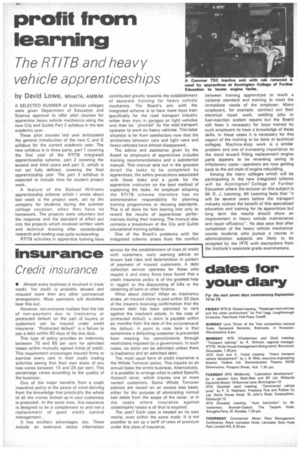profit from learning
Page 56

If you've noticed an error in this article please click here to report it so we can fix it.
The RTITB and heavy vehicle apprenticeships
by David Lowe, MInstTA, AMBIM
A SELECTED NUMBER of technical colleges were given Department of Education and Science approval to offer pilot courses for apprentice heavy vehicle mechanics using the new City and Guilds Part 2 syllabus in the last academic year.
These pilot courses last year anticipated the general introduction of the new C and G syllabus for the current academic year. The new syllabus is in three parts, part 1 covering the first year of the RTITB integrated apprenticeship scheme, part 2 covering the second and third years and part 3, which is not yet fully defined, covering the final apprenticeship year. The part 3 syllabus is expected to include time for student project work.
A feature of the Samuel Williams apprenticeship scheme which I wrote about last week is the project work, set by the company for students during the summer college vacation, when they have no homework. The projects were voluntary but the response and the standard of effort put into the projects which involved written work and technical drawing after considerable research and reading was quite outstanding.
RTITB activities in apprentice training have
contributed greatly towards the establishment of separate training for heavy vehicle mechanics. The Board's aim with the integrated scheme is to have more boys train specifically for the road transport industry rather than train in garages on light vehicles and then be -pinched" by the road transport operator to work on heavy vehicles. This latter situation is far from satisfactory now that the similarities between cars and light vans and heavy vehicles have almost disappeared.
The advice and assistance given by the Board to employers of apprentices includes training recommendations and a substantial manual. This manual sets out in the greatest detail the tasks to be completed by apprentices, the safety precautions associated with these tasks and a guide for the apprentice instructor on the best method of explaining the tasks. An employer adopting the RTITB scheme therefore has no administrative responsibility for planning training programmes or devising standards. This is all done for him leaving him only to record the results of apprentices' performances during their training. The manual also contains a breakdown of the City and Guilds educational training syllabus.
One of the Board's problems with the integrated scheme arises from the conflict between training apprentices to reach a national standard and training to meet the immediate needs of the employer. Many employers, for example, contract out their electrical repair work, welding jobs or fuel-injection system repairs but the Board still feels it necessary for boys trained by such employers to have a knowledge of these skills. In these cases it is necessary for this aspect of the training to be done at technical colleges. Machine-shop work is a similar problem and one of increasing importance as the trend toward fitting replacement engine parts appears to be reversing owing to inflationary costs—operators are now getting back to the old style of engine rebuilding.
Among the many colleges which will be participating in the new integrated scheme will be Accrington/ College of Further Education where the lecturer on this subject is Mr D. J. Leeming. Mr Leeming feels that "it will be several years before the transport industry notices the benefit of this specialized education and training for its apprentices but long term the results should show an improvement in heavy vehicle maintenance and repair efficiency-. He also says that after completion of the heavy vehicle mechanics' course students who pursue a course in administration subjects are likely to be Iaccepted by the IRTE with exemptions from the Institute's associate grade examinations.




























































































